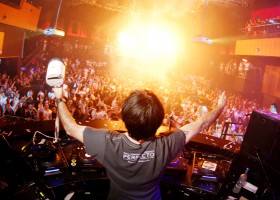The feature length films by the band Daft Punk are as brilliant as they are original and should be discussed more often so that others can experience these extraordinary stories as told by two of the greatest and most influential humans in the history of electronic music.
There aren’t many people that are familiar with the electronic music scene who haven’t heard of the French duo consisting of Guy-Manuel de Homem-Christo and Thomas Bangalter. Since the 90s, Daft Punk has created some of the most frequently played and sampled electronic music tracks of all time and as such they have become eternal icons of the genre. Though the band has influenced so many with their music, few have ever heard of the Daft Punk films and even fewer have seen them in their entirety.
Interstella 5555: The 5tory of the 5ecret 5tar 5ystem, was released in 2003. It is based upon the music from Daft Punk’s best-selling album Discovery, which solely acts as the film’s soundtrack. Produced under the supervision of the band’s ‘childhood hero,’ Leiji Matsumoto, Interstella makes for a visually stunning animated science fiction adventure. There is no dialogue in the film outside of the lyrics already within the music and the plot itself is simple, heroic aliens fighting for their freedom while destroying an ancient evil in the process and putting an interesting spin on the way people look at musicians. Just the same, it makes for an enjoyable first or tenth time viewing and is a magnificent alternative to what is already a great album.
Taking a significant departure, Electroma was released in 2006 as a live action film with absolutely no music from the band. Acting as an extension of Bangalter’s prior cinematic talents, the film itself is poetic and dark while the soundtrack, consisting of works from artists such as Brian Eno and Curtis Mayfield, once again speaks for the dialogue-free script. With robots being attacked for pretending to be humans and a never-ending pilgrimage through a barren wasteland, the meaning of the film is meant to be vague and personal to the viewer and as Guy-Manuel de Homem-Christo puts it, “It’s more a question than an answer. Some people see it as sad, some as happy. Everyone is different.”
Though vastly unalike, both films take the viewer beyond their previous understanding of Daft Punk’s talents and make for fine additions to any fan’s collection.






